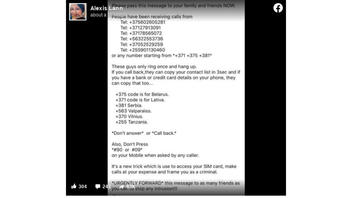
Is there a phone scam in which "these guys only ring once and hang up," and if you call back, they can copy your contact list in three seconds as well as your "bank or credit details"? No, that's not true: But, an AT&T spokesman emailed Lead Stories there is a scam by which a caller rings once and hangs up, in hopes a potential victim will call back, but with a different goal: running up international calling fees.
The claim appeared in a Facebook post (archived here) published December 22, 2019, under the title, "Please pass this message to your family and friends NOW." The post lists a series of international telephone numbers and area codes that people should avoid in order not to fall prey to the scam. The post then makes this claim:
These guys only ring once and hang up.
If you call back,they can copy your contact list in 3sec and if
you have a bank or credit details on your phone, they
can copy that too...
This is what the post looked like on Facebook at the time of writing:
(Source: Facebook screenshot taken on Wed Mar 17 18:34:39 2021 UTC)
The claim also mentions another cellphone scam in which the caller persuades the victim to press 90 or #09, purportedly allowing the scammer access to the victim's SIM card. The AT&T spokesman said those claims are false, and appear to be based on a decades-old scam involving business landlines.
The 15-month-old Facebook post has recently circulated wildly despite its false claims. Jim Greer, an AT&T assistant vice president for corporate communications, explained in an email to Lead Stories why the post's claim about scammers aiming to copy contact lists, bank and credit card information isn't true:
This post includes inaccurate information about different types of scams. The top portion references the one-ring call scam, which you can find more about here. The purpose of the scam is to get consumers to unknowingly call back international phone numbers and incur charges from international rates or other connection fees.
This section "they can copy your contact list in 3sec and if you have a bank or credit details on your phone, they can copy that too" is false and does not apply to this type of scam.
The Facebook post offers another claim about a cellphone scam that also begins with the scammer attempting to lure the person into calling back:
Also, Don't Press*90 or #09*
On your Mobile when asked by any caller.
It's a new trick which is used to access your SIM card, make
calls at your expense and frame you as a criminal.
*URGENTLY FORWARD* this message to as many friends as
you can to stop any intrusion!!!
Greer emailed Lead Stories that the claim is false:
Regarding the bottom portion that starts with "Also, Don't Press," we are not aware of a scam involving *90 or 09# for wireless. The 90# scam is a wireline scam and does not apply to wireless phones.
The Federal Communications Commission describes the wireline, or landline, scam on its website in the post, "Don't Fall for the 90# Telephone Scam." It describes how this scam works:
You receive a call at your office from someone claiming to be a telephone company employee investigating technical problems with your line, or checking up on calls supposedly placed to other states or countries from your line. The caller asks you to aid the investigation by either dialing 90# or by transferring the call to an outside line before hanging up. By doing this, you may be enabling the caller to place calls that are billed to your office telephone number.
The 90# scam has been around at least since 1998, according to the Wayback Machine, "a digital archive of the World Wide Web." The Wayback Machine's database includes an entry on the AT&T website describing the 90# scam on February 23, 2002.
Greer offered advice for avoiding phone scams:
As always, You should not answer calls from numbers you do not recognize. Also, if you receive a one-ring call from an unknown number, do not call that number back.


















